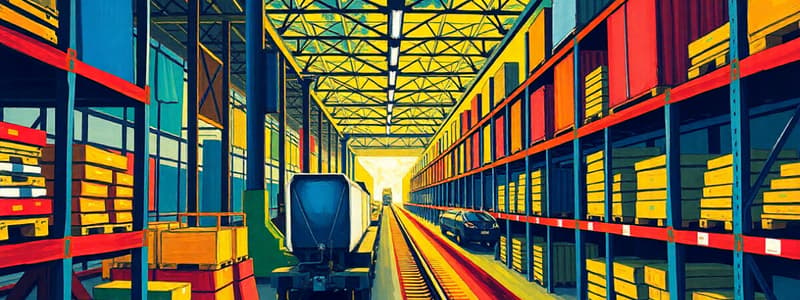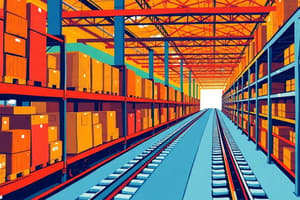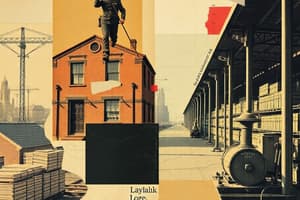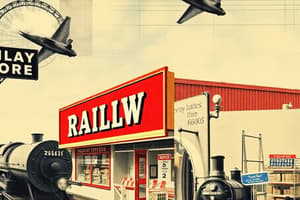Podcast
Questions and Answers
What is the primary responsibility of the Controller of Stores?
What is the primary responsibility of the Controller of Stores?
- To oversee passenger transportation logistics.
- To ascertain the needs for materials and stores. (correct)
- To conduct inspections of railway tracks.
- To manage staff in the Stores Department.
Why are certain stores held by users at the place of work?
Why are certain stores held by users at the place of work?
- To reduce the overall cost of materials.
- To prevent piecemeal requisitioning and manage emergencies. (correct)
- To ensure efficient transport of goods.
- To allow users to conduct their own inspections.
Which of the following is NOT a function of the Controller of Stores?
Which of the following is NOT a function of the Controller of Stores?
- Distribution of materials to various depots.
- Custody of materials while in the Stores Department.
- Inventory control of stocks on hand.
- Inspection of railway infrastructure. (correct)
Where are locomotive and carriage parts typically stored?
Where are locomotive and carriage parts typically stored?
What is a characteristic of the stocks held by the Controller of Stores?
What is a characteristic of the stocks held by the Controller of Stores?
Which material is NOT specifically mentioned as stored at work locations?
Which material is NOT specifically mentioned as stored at work locations?
What is one reason for leaving certain purchased materials in custody of the Stores Department?
What is one reason for leaving certain purchased materials in custody of the Stores Department?
What is the maximum value for proprietary articles subject to reasonable rates?
What is the maximum value for proprietary articles subject to reasonable rates?
What is the estimated value threshold for adopting the open tender system?
What is the estimated value threshold for adopting the open tender system?
For which indents can direct purchases be made with the Directorate General of Supplies and Disposals?
For which indents can direct purchases be made with the Directorate General of Supplies and Disposals?
What is the certification limit for minor casual indents against the advance grant?
What is the certification limit for minor casual indents against the advance grant?
What authority has the power to sign on behalf of the General Manager of Supplies and Disposals?
What authority has the power to sign on behalf of the General Manager of Supplies and Disposals?
What types of depots are typically associated with the main locomotive workshops?
What types of depots are typically associated with the main locomotive workshops?
Which category of subordinates is sanctioned imprest stocks of stores?
Which category of subordinates is sanctioned imprest stocks of stores?
What is the main function of Emergency Stores at the depots?
What is the main function of Emergency Stores at the depots?
What designation is given to items frequently and regularly required by the Stores Department?
What designation is given to items frequently and regularly required by the Stores Department?
Which type of stores comprises items that do not ordinarily wear out and are kept for emergencies?
Which type of stores comprises items that do not ordinarily wear out and are kept for emergencies?
What must occur before forming a new Stores Depot?
What must occur before forming a new Stores Depot?
Which of the following is NOT a type of depot mentioned in the content?
Which of the following is NOT a type of depot mentioned in the content?
Which letter marks the stock cards for Emergency Stores?
Which letter marks the stock cards for Emergency Stores?
What is the general purpose of having various types of stores depots?
What is the general purpose of having various types of stores depots?
Which of the following statements is true regarding Non-stock Items?
Which of the following statements is true regarding Non-stock Items?
What is the primary responsibility of the Controller of Stores regarding surplus materials?
What is the primary responsibility of the Controller of Stores regarding surplus materials?
Which of the following does the Controller of Stores NOT do?
Which of the following does the Controller of Stores NOT do?
What is included in the responsibilities of the Controller of Stores concerning the stores?
What is included in the responsibilities of the Controller of Stores concerning the stores?
Which statement best describes the nature of the Nomenclature-cum-Price List maintained by the Controller of Stores?
Which statement best describes the nature of the Nomenclature-cum-Price List maintained by the Controller of Stores?
How should materials that have no immediate use be handled according to the guidelines?
How should materials that have no immediate use be handled according to the guidelines?
What type of control does the Controller of Stores exercise over stock reporting?
What type of control does the Controller of Stores exercise over stock reporting?
Which aspect of stock management is emphasized for the Controller of Stores?
Which aspect of stock management is emphasized for the Controller of Stores?
In what manner should the Controller of Stores handle requisitions?
In what manner should the Controller of Stores handle requisitions?
What is a key duty related to the initial documentation for the Controller of Stores?
What is a key duty related to the initial documentation for the Controller of Stores?
What is the maximum purchase limit for the Chief Material Manager (CMM) as stated for the purchase of stores?
What is the maximum purchase limit for the Chief Material Manager (CMM) as stated for the purchase of stores?
What is required for purchases exceeding Rs. 15 Crores?
What is required for purchases exceeding Rs. 15 Crores?
Which category of articles can have a purchase limit of Rs. 15 Crores without additional approvals?
Which category of articles can have a purchase limit of Rs. 15 Crores without additional approvals?
For what estimated value do tender committees apply according to the guidelines?
For what estimated value do tender committees apply according to the guidelines?
What is the estimated purchase value for non-proprietary articles in normal circumstances?
What is the estimated purchase value for non-proprietary articles in normal circumstances?
Which group of officials is included in the term 'subordinate officers'?
Which group of officials is included in the term 'subordinate officers'?
What approval is necessary for the adoption of the single tender system for articles valued at Rs. 10 Lakhs or above?
What approval is necessary for the adoption of the single tender system for articles valued at Rs. 10 Lakhs or above?
What is the requirements for purchases valued over Rs. 3 Lakhs for non-proprietary articles?
What is the requirements for purchases valued over Rs. 3 Lakhs for non-proprietary articles?
Which type of purchase requires the submission of a tender?
Which type of purchase requires the submission of a tender?
In what circumstances is approval not required for certain purchases?
In what circumstances is approval not required for certain purchases?
What is the main reason for holding certain stores at users' locations rather than exclusively at the Stores Department?
What is the main reason for holding certain stores at users' locations rather than exclusively at the Stores Department?
Which category of stores is specifically mentioned as being typically kept in running sheds?
Which category of stores is specifically mentioned as being typically kept in running sheds?
Which responsibility is NOT attributed to the Controller of Stores?
Which responsibility is NOT attributed to the Controller of Stores?
In the context of materials stored by the Controller of Stores, which one represents funds that are not productive?
In the context of materials stored by the Controller of Stores, which one represents funds that are not productive?
Why might stores be left in custody of the Stores Department instead of being utilized immediately at the work site?
Why might stores be left in custody of the Stores Department instead of being utilized immediately at the work site?
What is a crucial factor for determining the necessity of maintaining certain stock levels by the Controller of Stores?
What is a crucial factor for determining the necessity of maintaining certain stock levels by the Controller of Stores?
What does the term 'materials-at site' refer to in the context of store management?
What does the term 'materials-at site' refer to in the context of store management?
What is the maximum amount that can be authorized for writing off losses of stores and tools and plant in stock due to negligence of railway employees?
What is the maximum amount that can be authorized for writing off losses of stores and tools and plant in stock due to negligence of railway employees?
Which reason requires verification from the Chief Accounts Officer before making adjustments to accounts?
Which reason requires verification from the Chief Accounts Officer before making adjustments to accounts?
Under which condition can adjustments in accounts be sanctioned without referral to the General Manager?
Under which condition can adjustments in accounts be sanctioned without referral to the General Manager?
Which of the following is NOT a condition for sanctioning adjustments of losses in stock?
Which of the following is NOT a condition for sanctioning adjustments of losses in stock?
What is the condition under which full powers for writing off articles of dead stock applies?
What is the condition under which full powers for writing off articles of dead stock applies?
What aspect of material management should the Controller of Stores prioritize?
What aspect of material management should the Controller of Stores prioritize?
What is required of the Controller of Stores regarding surplus materials?
What is required of the Controller of Stores regarding surplus materials?
What should the Nomenclature-cum-Price List maintained by the Controller of Stores include?
What should the Nomenclature-cum-Price List maintained by the Controller of Stores include?
What type of records does the Controller of Stores maintain for stock transactions?
What type of records does the Controller of Stores maintain for stock transactions?
What is one of the Controller of Stores' responsibilities regarding the inflow of materials?
What is one of the Controller of Stores' responsibilities regarding the inflow of materials?
What criteria must be considered when computing loss from the sale of surplus materials?
What criteria must be considered when computing loss from the sale of surplus materials?
Which of the following describes the approach the Controller of Stores should take for planning supplies?
Which of the following describes the approach the Controller of Stores should take for planning supplies?
Which body does NOT have full powers for disposal of surplus materials by tender?
Which body does NOT have full powers for disposal of surplus materials by tender?
What limitation applies to the Authority of the Controller of Stores?
What limitation applies to the Authority of the Controller of Stores?
What is essential for the maintenance of the stores by the Controller?
What is essential for the maintenance of the stores by the Controller?
What is the maximum allowable loss during direct sales to other government bodies?
What is the maximum allowable loss during direct sales to other government bodies?
Which statement best reflects the requirement for purchasing stores?
Which statement best reflects the requirement for purchasing stores?
In what scenario is full power to sell at auction applicable?
In what scenario is full power to sell at auction applicable?
Which of the following statements correctly represents the authority regarding the book value of items sold to quasi-government bodies?
Which of the following statements correctly represents the authority regarding the book value of items sold to quasi-government bodies?
Which governmental agency is included among those that can purchase direct sales from the Railway Department?
Which governmental agency is included among those that can purchase direct sales from the Railway Department?
What is the condition regarding freight charges when selling surplus materials?
What is the condition regarding freight charges when selling surplus materials?
What circumstances necessitate the adjustment between book value and sale value?
What circumstances necessitate the adjustment between book value and sale value?
Which of the following does NOT fall under the category of 'similar bodies' for material disposal purposes?
Which of the following does NOT fall under the category of 'similar bodies' for material disposal purposes?
What is the maximum limit for adjustments against the Stock Adjustment Account for each case?
What is the maximum limit for adjustments against the Stock Adjustment Account for each case?
Under what condition can the limit of Rs. 1,000 be extended to Rs. 10,000?
Under what condition can the limit of Rs. 1,000 be extended to Rs. 10,000?
Which of the following is NOT a reason for adjustment restriction?
Which of the following is NOT a reason for adjustment restriction?
What role does the General Manager play concerning tenders or contracts?
What role does the General Manager play concerning tenders or contracts?
Which situation does NOT warrant an adjustment to the Stock Adjustment Account?
Which situation does NOT warrant an adjustment to the Stock Adjustment Account?
What is a necessary condition for adjustments not requiring referral to the General Manager?
What is a necessary condition for adjustments not requiring referral to the General Manager?
What is the consequence of adjustments being due to negligence or dishonesty of a railway employee?
What is the consequence of adjustments being due to negligence or dishonesty of a railway employee?
Which statement is true regarding the approval process for adjustments?
Which statement is true regarding the approval process for adjustments?
What is the relationship between market rate fluctuations and adjustments?
What is the relationship between market rate fluctuations and adjustments?
Flashcards
Controller of Stores
Controller of Stores
The official responsible for managing a railway's store inventory, ensuring efficient and economical supply.
Stores Department
Stores Department
The department in charge of the administration and control of railway stores.
Inventory Control
Inventory Control
The process of managing and tracking the amount of stored railway materials and supplies.
Material at site (stores)
Material at site (stores)
Signup and view all the flashcards
Piecemeal requisitioning
Piecemeal requisitioning
Signup and view all the flashcards
Emergency use of stores
Emergency use of stores
Signup and view all the flashcards
Railway stores
Railway stores
Signup and view all the flashcards
Locomotive Stores Depot
Locomotive Stores Depot
Signup and view all the flashcards
Carriage and Wagon Stores Depot
Carriage and Wagon Stores Depot
Signup and view all the flashcards
Signal Stores Depot
Signal Stores Depot
Signup and view all the flashcards
Permanent-way Material Depots
Permanent-way Material Depots
Signup and view all the flashcards
Stationery Depot
Stationery Depot
Signup and view all the flashcards
Scrap and Unserviceable Material Depot
Scrap and Unserviceable Material Depot
Signup and view all the flashcards
Stock Items
Stock Items
Signup and view all the flashcards
Ordinary Stores
Ordinary Stores
Signup and view all the flashcards
Emergency Stores
Emergency Stores
Signup and view all the flashcards
Non-stock Items
Non-stock Items
Signup and view all the flashcards
What is the Controller of Stores responsible for?
What is the Controller of Stores responsible for?
Signup and view all the flashcards
What happens to materials not immediately needed by departments?
What happens to materials not immediately needed by departments?
Signup and view all the flashcards
What is the Nomenclature-cum-Price List used for?
What is the Nomenclature-cum-Price List used for?
Signup and view all the flashcards
What are the Controller of Stores' financial responsibilities?
What are the Controller of Stores' financial responsibilities?
Signup and view all the flashcards
What is the Controller of Stores' role in general supervision?
What is the Controller of Stores' role in general supervision?
Signup and view all the flashcards
What is the responsibility of the Controller of Stores in planning supplies?
What is the responsibility of the Controller of Stores in planning supplies?
Signup and view all the flashcards
How does the Controller of Stores ensure efficiency?
How does the Controller of Stores ensure efficiency?
Signup and view all the flashcards
What does the Controller of Stores have to deal with?
What does the Controller of Stores have to deal with?
Signup and view all the flashcards
What is the main objective of the Controller of Stores?
What is the main objective of the Controller of Stores?
Signup and view all the flashcards
Open Tender System
Open Tender System
Signup and view all the flashcards
Direct Purchase
Direct Purchase
Signup and view all the flashcards
DGS&D
DGS&D
Signup and view all the flashcards
General Purposes Grant
General Purposes Grant
Signup and view all the flashcards
Casual Indents
Casual Indents
Signup and view all the flashcards
What is the maximum purchase limit for a CMM?
What is the maximum purchase limit for a CMM?
Signup and view all the flashcards
What is the tender process for purchases over Rs. 10 lakhs?
What is the tender process for purchases over Rs. 10 lakhs?
Signup and view all the flashcards
When is a single tender system used?
When is a single tender system used?
Signup and view all the flashcards
What is the purchase limit for non-proprietary articles?
What is the purchase limit for non-proprietary articles?
Signup and view all the flashcards
What is the purchase limit for proprietary articles?
What is the purchase limit for proprietary articles?
Signup and view all the flashcards
PAC 'c'
PAC 'c'
Signup and view all the flashcards
Subordinate Officers
Subordinate Officers
Signup and view all the flashcards
Tender Committees
Tender Committees
Signup and view all the flashcards
What is the General Manager's role in purchases?
What is the General Manager's role in purchases?
Signup and view all the flashcards
How does the Stores Department ensure efficient supply?
How does the Stores Department ensure efficient supply?
Signup and view all the flashcards
Material at site
Material at site
Signup and view all the flashcards
Nomenclature-cum-Price List
Nomenclature-cum-Price List
Signup and view all the flashcards
General Supervisory Control
General Supervisory Control
Signup and view all the flashcards
Planning of Supplies
Planning of Supplies
Signup and view all the flashcards
Surplus and Unserviceable Materials
Surplus and Unserviceable Materials
Signup and view all the flashcards
What is the Controller's financial role?
What is the Controller's financial role?
Signup and view all the flashcards
How are stores managed for efficiency?
How are stores managed for efficiency?
Signup and view all the flashcards
What is the purpose of the Nomenclature-cum-Price List?
What is the purpose of the Nomenclature-cum-Price List?
Signup and view all the flashcards
How does the Controller ensure the most advantageous purchases?
How does the Controller ensure the most advantageous purchases?
Signup and view all the flashcards
Disposal of Unserviceable Stores
Disposal of Unserviceable Stores
Signup and view all the flashcards
Tender Process
Tender Process
Signup and view all the flashcards
Direct Sale to Government Bodies
Direct Sale to Government Bodies
Signup and view all the flashcards
Auction Process
Auction Process
Signup and view all the flashcards
Freight Cost in Sale
Freight Cost in Sale
Signup and view all the flashcards
Sale Price Adjustment
Sale Price Adjustment
Signup and view all the flashcards
Loss Limit on Direct Sales
Loss Limit on Direct Sales
Signup and view all the flashcards
Full Powers to Dispose
Full Powers to Dispose
Signup and view all the flashcards
Forfeiture Decision
Forfeiture Decision
Signup and view all the flashcards
Loading/Unloading Contracts
Loading/Unloading Contracts
Signup and view all the flashcards
Stock Adjustment Limit
Stock Adjustment Limit
Signup and view all the flashcards
Market Rate Fluctuations
Market Rate Fluctuations
Signup and view all the flashcards
Public Call for Tenders
Public Call for Tenders
Signup and view all the flashcards
Chief Accounts Officer’s Role
Chief Accounts Officer’s Role
Signup and view all the flashcards
Negligence/Carelessness Adjustment
Negligence/Carelessness Adjustment
Signup and view all the flashcards
Different Measurement Methods
Different Measurement Methods
Signup and view all the flashcards
Stock Adjustment Approval
Stock Adjustment Approval
Signup and view all the flashcards
General Manager Approval
General Manager Approval
Signup and view all the flashcards
What is PAC 'c'?
What is PAC 'c'?
Signup and view all the flashcards
Study Notes
Chapter 1: Introductory Organisation
- The Controller of Stores manages railway stores, overseeing efficient & economical material acquisition, receipt, inspection, and distribution.
- The Controller is responsible for store depots' inventory control.
- Some railway stores are held by users (e.g., permanent way materials by inspectors) due to practicality or emergencies.
- Stocks should be sufficient but minimal to prevent obsolesce or deterioration.
- All surplus or unserviceable material should be returned or sold.
- A nomenclature-cum-price list is maintained for each store item.
- The Controller of Stores is not a disbursing officer; store-related record-keeping is limited.
- The Controller must be informed of stock levels, department requisitions, incoming materials not needed, and surplus/unserviceable disposal methods.
- Planning supplies involves estimating annual store requirements, leveraging purchase policies for optimal cost-effectiveness.
- Stores should be purchased through the Directorate General of Supplies & Disposals where appropriate.
- Certain stores (coal, rails, sleepers) are procured by the Railway Board.
- Stores are categorized into depots (e.g., locomotive, carriage & wagon).
- Stock items are regularly used & cost-effective for inventory.
- Ordinary stores are in frequent demand, while emergency stores cover unexpected needs.
- Non-stock items are specific-use, not regularly stored.
- Surplus stores (movable/dead) are those not used for 24/2 years respectively.
- Surplus material disposal includes selling it to other railways, selling by tender/direct sale, or for disposal by sale.
- Minimum stock is an average weekly use projection for timely delivery of supplies when needed.
- Maximum stock limits are based on factors like purchase size and potential capital lock-up.
- Workshop-related stock quantity standards are guided by works managers' recommendations.
- Powers are delegated by the general manager to the controller of stores.
- Financial standards apply when approving expenditures.
Chapter 1: Stores Depots
- Stores are divided into general and engineering stores, incorporating permanent way sections.
- Locations of stores depots are often near railway workshops/railway shops.
- Depot officers manage individual depots under the Controller of Stores.
- Imprest stocks are maintained by lower-level staff (e.g., running shed foreman).
- The Controller of Stores is responsible for the purchase, sale, and inspection of all railway materials.
- The Controller of Stores is responsible for maintaining appropriate stock levels of various materials and stores.
- All sales are processed through a central system.
- There must be a systematic checking of materials before any surplus material removal.
Studying That Suits You
Use AI to generate personalized quizzes and flashcards to suit your learning preferences.




